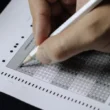In a historic moment, the sacred Kiswa, the covering cloth of the Holy Kaaba, was crafted in Karachi, Pakistan, in the year 1962. This significant event took place after a Saudi delegation visited various workshops in the city and entrusted the prestigious task to Waheed-ud-Din Ansari, the owner of a fabric store in Karachi’s Saddar area, renowned for selling silk cloth.
The process began when the Saudi authorities ordered the silk-house to prepare a sample of the Kiswa. To their delight, Shah Saud bin Abdulaziz Al Saud, the then-Saudi monarch, was highly impressed by the craftsmanship and quality of the sample. As a result, Ansari and his team were honored with the responsibility of producing the Kiswa, although the fabric itself was sent from Saudi Arabia.
Under the vigilant supervision of Ansari, 34 skilled workers worked diligently for three months to complete this sacred task. Notably, even the then-Pakistani president, General Ayub Khan, personally participated in this holy endeavor.
The Kiswa, an awe-inspiring gold-laced black cloth shrouding the Holy Kaaba, is made of dyed silk embroidered with 120 kilograms of gold and 100 kilograms of silver wires. It features verses from the Holy Quran and symbolizes immense honor and blessings for Muslims worldwide.
Before being returned to Saudi Arabia, the completed Kiswa was proudly displayed to thousands of people at Polo Ground in Karachi. This momentous occasion marked an exceptional chapter in Pakistan’s history, where the nation had the privilege of contributing to the timeless tradition of preparing the Holy Kaaba’s cover, a symbol of unity and devotion for millions of Muslims around the world.








